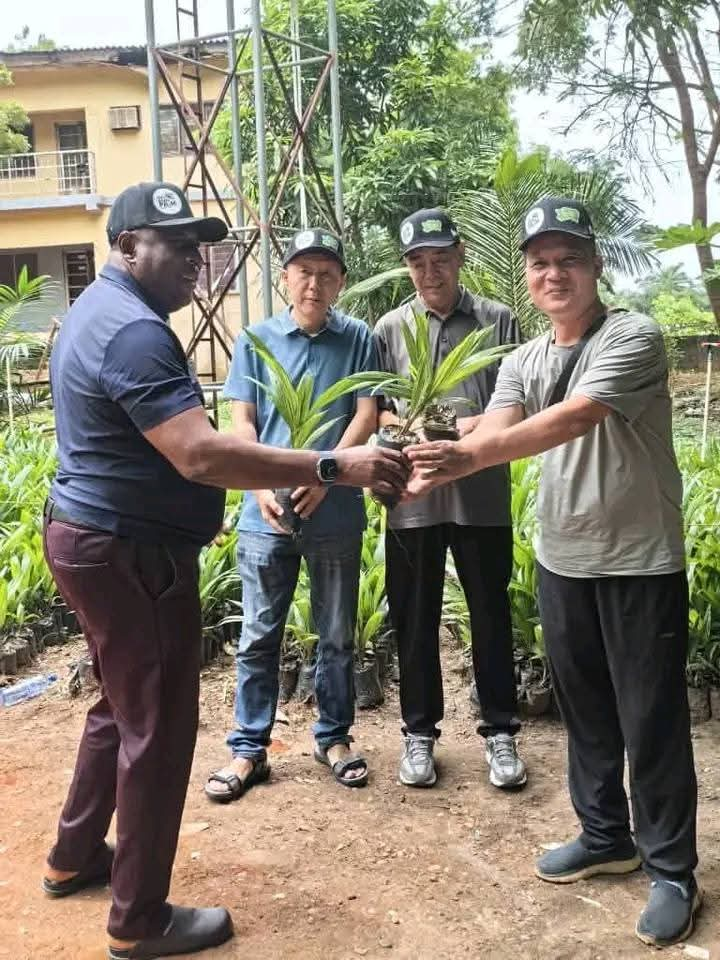The Government of Benue State has announced a partnership with a delegation of Chinese investors to launch the Alia Palm Project, a comprehensive initiative intended to revitalize the state’s oil palm industry. The project proposes large-scale plantations, modern processing facilities, and full value-chain development designed to boost revenue, create employment, and empower local farmers.
The Alia Palm Project: A Vision for Benue’s Agricultural Renewal
Governor Hyacinth Alia, via his Special Adviser on Foreign Investment, confirmed that talks with the visiting investors were encouraging and that both sides were aligned on the need for responsible, inclusive development. The Alia Palm Project will reportedly encompass:
- Extensive oil palm plantations across selected local government areas, leveraging Benue’s fertile soils.
- Modern processing plants equipped with up-to-date extraction and refining technology to maximize oil yields and by-product utilization.
- Full value-chain development including planting, harvesting, processing, packaging, and market linkages for both domestic and export channels.
- High-yield nurseries to produce improved seedlings and ensure a continuous supply of planting material.
- Farmer training and extension services to transfer modern cultivation techniques and quality control standards to smallholder farmers.
The partnership aims to combine foreign technical and financial expertise with local knowledge and resources. According to project spokespeople, there will be deliberate efforts to incorporate smallholder out-grower schemes, ensuring that rural communities benefit directly from investments rather than being displaced or marginalised.
Why Palm Oil Matters for Nigeria
Palm oil is a high-demand commodity used across food, cosmetics, industrial applications, and increasingly in renewable energy. Historically, Nigeria was a dominant global producer. In the decades following independence, the country’s palm oil industry supported rural economies and export revenues.
However, structural neglect, policy inconsistency, and underinvestment over several decades contributed to a steep decline in production capacity. Today, Nigeria imports significant quantities of palm oil despite having large swathes of arable land and a climate suitable for cultivation. Reviving domestic production, experts argue, is a practical step toward retaining value in-country and creating millions of agricultural livelihoods.
Why Chinese Investors Are Interested in Benue
The visiting delegation attributed their interest in Benue State to several decisive factors:
- Fertile agricultural land: Benue is widely recognised as the “Food Basket of the Nation” due to its diverse and productive soil types.
- Favourable climate: The region’s rainfall patterns and temperatures are well-suited to oil palm cultivation.
- Strategic logistics: Benue serves as a land bridge to key northern and southern Nigerian markets, offering distribution advantages.
- Policy support: Benue’s administration has signalled investor-friendly policies and facilitation measures to attract capital.
- Track record: The investors emphasised their experience in agro-industrial projects across Asia and Africa, expressing confidence in adapting those methodologies to local conditions in Benue.
Their proposed model combines capital investments with technical assistance, research into high-yield varieties, and the introduction of mechanised processing methods that can increase efficiency and reduce post-harvest losses.
The Role of the Benue State Government
Governor Alia has publicly assured stakeholders that the state will facilitate the project by providing necessary land allotments, improving access roads, and ensuring adequate utility connections where feasible. Importantly, the government has also committed to implementing policies that balance investor protections with mechanisms to safeguard the rights and livelihoods of host communities.
Officials emphasise that public-private collaboration will include:
- Land identification and allocation, following due process and community consultation.
- Infrastructure support, particularly feeder roads, electrification plans, and water supply systems for processing zones.
- Regulatory facilitation, including tax incentives, permits, and streamlined approvals for planting and processing facilities.
- Monitoring frameworks to ensure environmental compliance, labour standards, and local content requirements.

Opportunities for Local Farmers
A central pillar of the Alia Palm Project is inclusive farmer participation. The project promises multiple benefits for smallholder farmers and rural communities:
- Improved planting materials: High-yield nursery programmes will provide farmers access to disease-resistant, high-yield seedlings.
- Training & extension: Hands-on training in cultivation practices, integrated pest management, and harvesting techniques aims to raise productivity.
- Out-grower schemes: Structured supply contracts and guaranteed off-take agreements offer farmers reliable markets and predictable incomes.
- Employment: Jobs in nurseries, plantations, processing plants, logistics, and support services will be created for local communities.
- Value retention: With on-site processing, a larger share of the palm value chain will occur locally, raising incomes beyond raw fruit sales.
For these benefits to be realised, civil society groups say farmers will need formal inclusion in planning and benefit-sharing agreements that are transparent and legally enforceable.
Economic Impact: Jobs and Revenue
Economic analysts estimate that a project of this scale, if implemented comprehensively, could generate tens of thousands of direct and indirect jobs across planting, processing, transportation and ancillary services. The creation of an agro-industrial hub could expand Benue State’s internally generated revenue (IGR) through taxes, levies, and increased economic activity.
Reduced palm oil imports would conserve foreign exchange and stimulate domestic manufacturing of consumer goods that rely on palm oil as a feedstock. Moreover, local processing increases the potential for downstream industries such as soap manufacturing and packaging to develop, multiplying employment and local enterprise opportunities.
Global Palm Oil Market: Why Timing Matters
The global demand for palm oil remains strong, both for food products and industrial uses. Market analysts have projected steady growth over the coming decade. For Nigeria, the timing for re-investing in palm oil is compelling: with rising global prices and concerns over supply chains, strong domestic production could open export opportunities while satisfying local demand.
Benue’s entry into large-scale, modern palm oil production would position the state to capture new market share in West Africa and potentially beyond, provided quality standards, certification, and logistics are prioritised.
Environmental and Social Considerations
Large-scale agricultural expansions can bring environmental risks if not managed responsibly. Issues commonly associated with palm oil development globally include deforestation, biodiversity loss, and conflicts over land rights. Benue’s authorities and investor partners have stated their intention to avoid these pitfalls by adopting sustainable practices and community-first strategies.
Recommended safeguards include:
- No-go forest policies: Avoiding the clearing of primary forests and protecting high-conservation-value areas.
- Agroforestry and mixed-cropping: Reducing monoculture by integrating complementary crops and preserving ecosystem services.
- Land tenure clarity: Securing free, prior and informed consent (FPIC) from communities before land transactions.
- Labour standards: Ensuring fair wages, safe working conditions, and the right to organise for workers.
- Gender inclusion: Designing programmes that recognise and empower women farmers, who play crucial roles in local agriculture.
If these elements are embedded in project contracts and monitored transparently, the partnership could become a reference case for sustainable agro-investment in Nigeria.
Voices from Experts and Stakeholders
“This is exactly the kind of investment Nigeria needs—bringing foreign expertise into our fertile lands. If managed transparently, it could transform Benue’s economy within a decade.” Dr. Emmanuel Iorhemba, Agricultural Development Expert
“We want to be part of this. If they give us seedlings and train us, we will grow the palm. What we need is access to markets and fair prices.” — Mrs. Veronica Agema, Farmer, Vandeikya LGA
These statements illustrate the cautious optimism among both technical experts and grassroots stakeholders. For many farmers, the appeal is tangible: productive land plus secure markets equals sustainable income growth. For experts, the appeal lies in applying modern agronomy, processing efficiency, and organized value chain models.
Challenges That Must Be Addressed
Despite the promise, several critical challenges could hinder the project if left unaddressed:
- Land acquisition disputes: Without proper consultation and legal safeguards, conflicts could arise between investors and host communities.
- Poor rural infrastructure: Bad roads, weak power supply, and limited access to finance can bottleneck production and transport.
- Policy continuity: Changes in political leadership or regulatory environments could undermine long-term commitments.
- Environmental risks: Monocropping and irresponsible land clearing may generate ecological damage and reputational risk.
- Financing gaps: If project costs exceed expectations, additional funding sources or public guarantees may be required.
Proactive mitigation measures, such as establishing community grievance mechanisms, phased infrastructure development plans, and multi-stakeholder oversight committees, can reduce these risks and increase the likelihood of sustainable success.
Implementation Roadmap: Key Phases
Based on standard agro-industrial practice and statements from the parties involved, the Alia Palm Project is expected to proceed through several phases:
- Feasibility & due diligence: Final technical surveys, environmental and social impact assessments, and legal reviews.
- Pilot phase: Establishment of demonstration plots and a pilot processing unit to validate crop performance and processing designs.
- Scale-up: Progressive expansion of plantations, nurseries and processing facilities while onboarding out-growers.
- Commercial operations: Full-scale processing, packaging, and market distribution for domestic and export markets.
- Continuous improvement: Ongoing training, R&D for yield improvement, and certification for international markets where appropriate.
Financing, Partnerships and Local Content
Investment of this nature typically combines private equity, concessional loans, and possible public support for infrastructure. Local content clauses are crucial for maximising job creation and retaining value. The state government has indicated its intention to prioritise local contractors, local workforce training, and local procurement where practical.
To attract long-term capital, project contracts should be transparent, enforceable, and aligned with national regulations. International best practice also recommends third-party monitoring for environmental and social compliance to reassure lenders and buyers.
Monitoring, Reporting & Social Accountability
Effective monitoring will include:
- Regular environmental and social audits;
- Public reporting of project progress and benefits;
- Community oversight forums with local leaders and farmer representatives;
- Third-party verification of sustainability standards and yield claims.
Social accountability makes the difference between a project that benefits a narrow set of actors and one that drives broad-based rural development.
Conclusion
The partnership between Chinese investors and the Benue State Government on the Alia Palm Project represents a potentially transformative step for the state’s agricultural economy. Benue’s fertile lands and strategic position, combined with foreign technical expertise and deliberate government support, create an environment conducive to large-scale agricultural development.
If managed transparently, inclusively, and sustainably, the project could contribute to job creation, revenue generation, food and industrial raw material security, and diversification of Nigeria’s economic base. It could also provide a template for responsible agro-industrial investment elsewhere in the country.
As the parties move from negotiation into concrete implementation, the details that matter most will be those that secure community rights, protect the environment, and ensure that the economic gains of the Alia Palm Project are widely shared across Benue State.













In recent time , oil palm took a large share in marketing environment which made it to be scarce
As a result of this; the demand is very high right from the grass roots down to international markets.
Kudos to WORKERHOLICALIA ” OUR BENUE, YOUR BENUE”